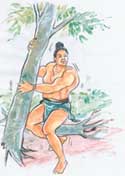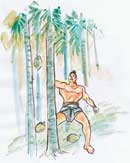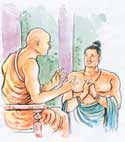|
This
article is part of a continuing series on the ‘Mahavamsa’,
the recorded chronicle of Sri Lankan history.
Two
more warriors are enrolled
 It
was the 2nd century BC. At this time, there lived a wealthy merchant
named Mahanaga, in the village of Nitulvita, in the Southern Province.
He had seven sons. The youngest was named Abhaya. He was rather
short and his elders nicknamed him Gotha. Abhaya however, was
strong and powerful but did not display his strength so far. While
his elder brothers worked in the fields, he used to stay at home,
eating, drinking and relaxing. His elder brothers repeatedly complained
about his behaviour to his parents but things did not change for
the better. It
was the 2nd century BC. At this time, there lived a wealthy merchant
named Mahanaga, in the village of Nitulvita, in the Southern Province.
He had seven sons. The youngest was named Abhaya. He was rather
short and his elders nicknamed him Gotha. Abhaya however, was
strong and powerful but did not display his strength so far. While
his elder brothers worked in the fields, he used to stay at home,
eating, drinking and relaxing. His elder brothers repeatedly complained
about his behaviour to his parents but things did not change for
the better.- One day,
the elder brothers started clearing a plot of land to start a
new crop. They did their share and left, quite a big area uncleared
for Abhaya to do. When the elders asked him to attend to this
work, he took no notice. The brothers got angry and shouted at
him. Abhaya was infuriated. He thought he must show them his power.
He went, cleared the portion left for him, flattened the land,
uprooted the Imbul trees and prepared it for cultivation, within
a very short time.
-
 He
returned home and pretended that nothing was done. When the brothers
inquired whether he had done his part, he said, “You go
and see for yourselves”. The brothers were taken aback when
they saw the Imbul trees he had pulled out. They thought he was
more powerful than any of them. When the neighbours heard of this
they too went and saw what Abhaya had done. They were simply shocked.
He became known as Gothaimbara. This news reached King Kavan-Tissa.
The king sent his men to bring Gothabhaya, and so he left home. He
returned home and pretended that nothing was done. When the brothers
inquired whether he had done his part, he said, “You go
and see for yourselves”. The brothers were taken aback when
they saw the Imbul trees he had pulled out. They thought he was
more powerful than any of them. When the neighbours heard of this
they too went and saw what Abhaya had done. They were simply shocked.
He became known as Gothaimbara. This news reached King Kavan-Tissa.
The king sent his men to bring Gothabhaya, and so he left home.
 Now,
close to Kotagala, there was a village named Katigama, where a
wealthy man named Rohana lived. He had an only son named Gothabhaya.
He was found to be extra strong at the age of about 13 years.
Gothabhaya’s father was a devout Buddhist. Once, after listening
to a sermon by a Bikkhu named Sumana, Rohana, got disgusted of
household life and wanted to be a priest. He informed his only
son of this wish. Then the son too, wanted to get into robes.
Both of them were ordained as monks. The father meditated and
reached ‘Arhanthood’ and so was a Thera. Gothabhaya
then came to be known as Thera-Puttabhaya – son of the Thera.
Both monks lived in a temple built amid a huge coconut plantation,
in the village of Paspandura. Now,
close to Kotagala, there was a village named Katigama, where a
wealthy man named Rohana lived. He had an only son named Gothabhaya.
He was found to be extra strong at the age of about 13 years.
Gothabhaya’s father was a devout Buddhist. Once, after listening
to a sermon by a Bikkhu named Sumana, Rohana, got disgusted of
household life and wanted to be a priest. He informed his only
son of this wish. Then the son too, wanted to get into robes.
Both of them were ordained as monks. The father meditated and
reached ‘Arhanthood’ and so was a Thera. Gothabhaya
then came to be known as Thera-Puttabhaya – son of the Thera.
Both monks lived in a temple built amid a huge coconut plantation,
in the village of Paspandura. One
day when Thera-puttabhaya was not in the temple, Gothaimbara went
past the temple, on his way to Magama. He felt very thirsty. He
jumped inside the temple premises, shook the coconut trees and
made a lot of young coconuts fall. He drank the water of some
of them, ate the kernel and gave enough to the others who were
around him. The caretaker saw all this but kept quiet through
this feat. Gothaimbara in the meantime, having satisfied his hunger
and thirst, sat under a tree to rest for a while. There, he fell
asleep. When Theraputtabhaya returned to the temple, he saw coconut
husks and shells thrown all over and the temple land in a mess.
When he asked the caretaker who the culprit was, he pointed at
Gothaimbara. One
day when Thera-puttabhaya was not in the temple, Gothaimbara went
past the temple, on his way to Magama. He felt very thirsty. He
jumped inside the temple premises, shook the coconut trees and
made a lot of young coconuts fall. He drank the water of some
of them, ate the kernel and gave enough to the others who were
around him. The caretaker saw all this but kept quiet through
this feat. Gothaimbara in the meantime, having satisfied his hunger
and thirst, sat under a tree to rest for a while. There, he fell
asleep. When Theraputtabhaya returned to the temple, he saw coconut
husks and shells thrown all over and the temple land in a mess.
When he asked the caretaker who the culprit was, he pointed at
Gothaimbara.- Theraputtabhaya
caught Gothamaimbara by his leg and dragged him right round the
temple premises. The onlookers requested the monk not to harm
him. But the punishment continued. Gothaimbara then said, “O
dear monk, please do pardon me. I’ll bring coconuts to replace
the ones that I have eaten. I can even cultivate an entire plantation
for the temple. Please let me go”. The monk then released
him. After a long conversation, they became friends. Gothaimbara
met King Kavan-Tissa. Once in the king’s service, he told
the king about the priest Theraputtabhaya.
- The king
sent Gothaimbara to request Theraputtabhaya to give up robes and
join the king’s service. Gothaimbara, went, worshipped at
the feet of the monk and said, “The king needs your assistance
to protect the country from enemies. Please derobe and join us.
When the task of chasing the enemy is accomplished, you can get
back into robes”. After a lot of pleading, Theraputtabhaya
went to Magama and joined the king’s service. He was known
as warrior Theraputtabhaya.
- Once the
battle was won, Theraputtabhaya did not linger to receive any
awards. When King Dutugemunu questioned him, he said, “O
King, I’ve done my duty by my country. I do not need any
recognition for the services rendered. Now I must get back into
robes and try to defeat the enemy ‘Klesa’- the impurities
of mind”. The king granted him permission. He went to all
other warriors, hugged them and bade good-bye. That was the day
one could notice tears in the eyes of hard-hearted warriors. Theraputtabhaya
was back in the temple.
By
Halaliye Karunathilaka
Edited and translated by Kamala Silva
Illustrated by
Saman Kalubowila |
 It
was the 2nd century BC. At this time, there lived a wealthy merchant
named Mahanaga, in the village of Nitulvita, in the Southern Province.
He had seven sons. The youngest was named Abhaya. He was rather
short and his elders nicknamed him Gotha. Abhaya however, was
strong and powerful but did not display his strength so far. While
his elder brothers worked in the fields, he used to stay at home,
eating, drinking and relaxing. His elder brothers repeatedly complained
about his behaviour to his parents but things did not change for
the better.
It
was the 2nd century BC. At this time, there lived a wealthy merchant
named Mahanaga, in the village of Nitulvita, in the Southern Province.
He had seven sons. The youngest was named Abhaya. He was rather
short and his elders nicknamed him Gotha. Abhaya however, was
strong and powerful but did not display his strength so far. While
his elder brothers worked in the fields, he used to stay at home,
eating, drinking and relaxing. His elder brothers repeatedly complained
about his behaviour to his parents but things did not change for
the better. He
returned home and pretended that nothing was done. When the brothers
inquired whether he had done his part, he said, “You go
and see for yourselves”. The brothers were taken aback when
they saw the Imbul trees he had pulled out. They thought he was
more powerful than any of them. When the neighbours heard of this
they too went and saw what Abhaya had done. They were simply shocked.
He became known as Gothaimbara. This news reached King Kavan-Tissa.
The king sent his men to bring Gothabhaya, and so he left home.
He
returned home and pretended that nothing was done. When the brothers
inquired whether he had done his part, he said, “You go
and see for yourselves”. The brothers were taken aback when
they saw the Imbul trees he had pulled out. They thought he was
more powerful than any of them. When the neighbours heard of this
they too went and saw what Abhaya had done. They were simply shocked.
He became known as Gothaimbara. This news reached King Kavan-Tissa.
The king sent his men to bring Gothabhaya, and so he left home. Now,
close to Kotagala, there was a village named Katigama, where a
wealthy man named Rohana lived. He had an only son named Gothabhaya.
He was found to be extra strong at the age of about 13 years.
Gothabhaya’s father was a devout Buddhist. Once, after listening
to a sermon by a Bikkhu named Sumana, Rohana, got disgusted of
household life and wanted to be a priest. He informed his only
son of this wish. Then the son too, wanted to get into robes.
Both of them were ordained as monks. The father meditated and
reached ‘Arhanthood’ and so was a Thera. Gothabhaya
then came to be known as Thera-Puttabhaya – son of the Thera.
Both monks lived in a temple built amid a huge coconut plantation,
in the village of Paspandura.
Now,
close to Kotagala, there was a village named Katigama, where a
wealthy man named Rohana lived. He had an only son named Gothabhaya.
He was found to be extra strong at the age of about 13 years.
Gothabhaya’s father was a devout Buddhist. Once, after listening
to a sermon by a Bikkhu named Sumana, Rohana, got disgusted of
household life and wanted to be a priest. He informed his only
son of this wish. Then the son too, wanted to get into robes.
Both of them were ordained as monks. The father meditated and
reached ‘Arhanthood’ and so was a Thera. Gothabhaya
then came to be known as Thera-Puttabhaya – son of the Thera.
Both monks lived in a temple built amid a huge coconut plantation,
in the village of Paspandura. One
day when Thera-puttabhaya was not in the temple, Gothaimbara went
past the temple, on his way to Magama. He felt very thirsty. He
jumped inside the temple premises, shook the coconut trees and
made a lot of young coconuts fall. He drank the water of some
of them, ate the kernel and gave enough to the others who were
around him. The caretaker saw all this but kept quiet through
this feat. Gothaimbara in the meantime, having satisfied his hunger
and thirst, sat under a tree to rest for a while. There, he fell
asleep. When Theraputtabhaya returned to the temple, he saw coconut
husks and shells thrown all over and the temple land in a mess.
When he asked the caretaker who the culprit was, he pointed at
Gothaimbara.
One
day when Thera-puttabhaya was not in the temple, Gothaimbara went
past the temple, on his way to Magama. He felt very thirsty. He
jumped inside the temple premises, shook the coconut trees and
made a lot of young coconuts fall. He drank the water of some
of them, ate the kernel and gave enough to the others who were
around him. The caretaker saw all this but kept quiet through
this feat. Gothaimbara in the meantime, having satisfied his hunger
and thirst, sat under a tree to rest for a while. There, he fell
asleep. When Theraputtabhaya returned to the temple, he saw coconut
husks and shells thrown all over and the temple land in a mess.
When he asked the caretaker who the culprit was, he pointed at
Gothaimbara.